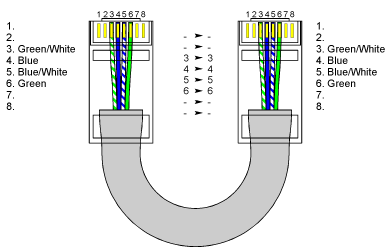
When wiring up an IP camera, or any other IP device for that matter, you must use a CAT 5 data cable containing 4 pairs of wires. Each pair consists of a solid coloured wire and a strip of the same colour on a white background. The plugs used for connecting network cables are called RJ45 plugs and RJ stands for "Registered Jack".
There are two standard colour codes for RJ-45 wiring: T-568A and T-568B. Although there are 4 pairs of wires, 10BaseT/100BaseT Ethernet uses only 2 pairs: Orange and Green. The other two colours (blue and brown) may be used for a second Ethernet line or for phone connections. The two wiring standards are used to create a cross-over cable (T-568A on one end, and T-568B on the other end), or a straight-through cable (T-568B or T-568A on both ends).
You would normally use a standard T-568B wiring for both ends of your CAT 5 cable when connecting equipment such as IP Cameras, Printers and Computers etc. to a Router or to an ethernet switch or hub. (you could use both T-568A instead but this is less common and not recommended).
If you have to connect a computer to another computer directly with an Ethernet cable or an IP Camera directly to a Computers RJ45 socket then you would need a "cross over" cable. A cross over cable uses one end wired as T-568A and one wired as T-568B.
It is also possible to use just the 4 wires needed for the Ethernet connection and examples are aslo shown for this below, but for maximum compatibility and continuity of standards its recommended to use the 8 wire configurations shown.
Wire like this to connect your IP camera to your Router
This the correct colour code/wiring for a standard RJ45 straight through patch lead.
This is the most common type of lead used and lets you connect IP Cameras, Video Webservers, Printers, Computers and many other IP enabled devices to a network hub, Broadband Router etc.
RJ45 plugs are crimp plugs and you need a special crimping tool to fit them to the cable.
First you strip the coloured wires from the outer sheath, then you flatten the end of the cable so it will fit into the plug. Separate and align the individual wires as shown and cut them to length. Finally push them into the plug and crimp on with the tool.
This is the most common and most likely lead you will need to make.
Standard Wiring for RJ45 Plug

Wire like this if you need to connect your IP camera directly to a PC, i.e. no switch or router in between
This the correct colour code/wiring for a cross over RJ45 patch lead.
This is the type of lead you need to connect a computer directly to another one via RJ45 or an IP camera to a PC without a switch or router in between.
RJ45 plugs are crimp plugs and you need a special crimping tool to fit them to the cable.
First you strip the coloured wires from the outer sheath, then you flatten the end of the cable so it will fit into the plug. Separate and align the individual wires as shown and cut them to length. Finally push them into the plug and crimp on with the tool.
Crossover Wiring for RJ45 Plug

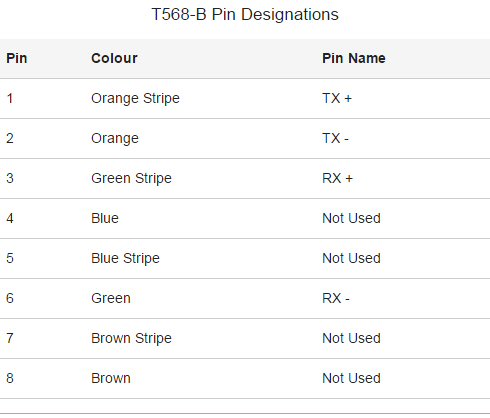
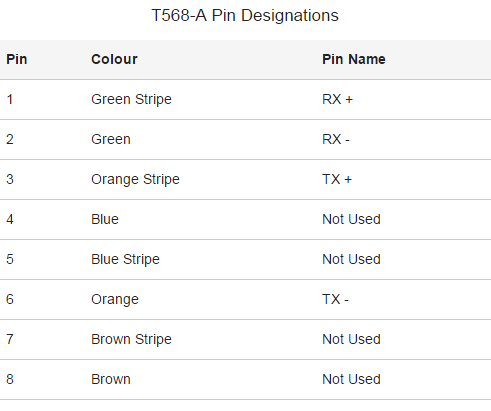
4 Wire Straight Through RJ45 Patch Lead
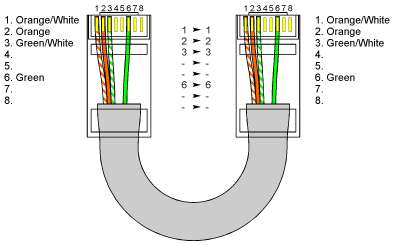
4 Wire Cross Over RJ45 Patch Lead
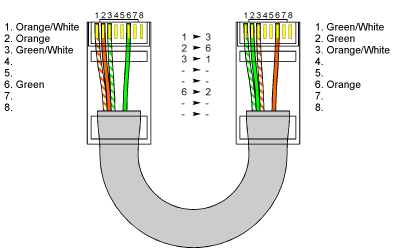
6 Wire Straight Through Voice And Data Cable
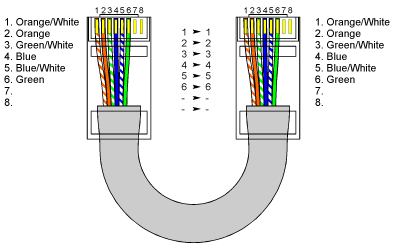
Token Ring Cable
